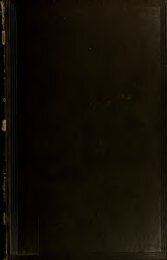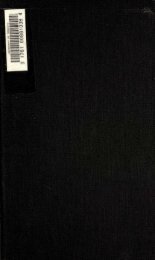Texts from the Buddhist canon : commonly known as Dhammapada
Texts from the Buddhist canon : commonly known as Dhammapada
Texts from the Buddhist canon : commonly known as Dhammapada
Create successful ePaper yourself
Turn your PDF publications into a flip-book with our unique Google optimized e-Paper software.
46 •<br />
DHAMMAPADA.<br />
countless thousands, like <strong>the</strong>mselves, throughout <strong>the</strong> world,<br />
were converted and saved.<br />
2. In old time, when Buddha w<strong>as</strong> residing in <strong>the</strong> country<br />
of Kaus§,mbl, in a certain Vih^ra called Mei-jdn (beautiful<br />
voice), and preaching for <strong>the</strong> sake of <strong>the</strong> four orders, <strong>the</strong>re<br />
w<strong>as</strong> a certain Brahmach§,rin, unrivalled for knowledge of<br />
Scripture, who being unable to find any one equal to him-<br />
self in argument, w<strong>as</strong> accustomed to carry, wherever he<br />
went, a lighted Torch in his hand. One day a man in <strong>the</strong><br />
market-place of a certain town, seeing him thus, <strong>as</strong>ked<br />
him <strong>the</strong> re<strong>as</strong>on of his strange conduct, on which he replied<br />
— " The world is so dark, and men so deluded, that I carry<br />
this Torch to light it, up so far <strong>as</strong> I can."l At this time<br />
Buddha transformed himself into a man of eminence<br />
(magistrate), who, sitting on his chair of of&ce in <strong>the</strong><br />
market-place, forthwith called out to <strong>the</strong> Brahmachi,rin,<br />
" What ho <strong>the</strong>re ! what are you about (with that Torch) 1"<br />
To whom <strong>the</strong> Brahmach§,rin replied, " All men are so<br />
wrapped in ignorance and gloom, that I carry this Torch to<br />
illumine <strong>the</strong>m." Then <strong>the</strong> magistrate <strong>as</strong>ked him again, "And<br />
are you so learned <strong>as</strong> to be acquainted with <strong>the</strong> four treatises<br />
(vidy§,s) which occur in <strong>the</strong> midst of <strong>the</strong> Sacred Books, to<br />
wit, <strong>the</strong> treatise on Literature (^abdavidyl) ; <strong>the</strong> treatise on<br />
<strong>the</strong> '' Heavenly Bodies and <strong>the</strong>ir Paths ;<br />
" <strong>the</strong> treatise on<br />
" Government ;<br />
" and <strong>the</strong> treatise on " Military Art " ? On<br />
<strong>the</strong> Brahmach§,rin beiag forced to confess he w<strong>as</strong> unacquainted<br />
with <strong>the</strong>se things, he flung away his Torch, and<br />
Buddha appearing in his glorious body, added <strong>the</strong>se words—<br />
" If any man, whe<strong>the</strong>r lie be learned or not, con-<br />
sider himself so great <strong>as</strong> to despise o<strong>the</strong>r men, he is<br />
like a blind man holding a candle—blind himself,<br />
he illumines o<strong>the</strong>rs."<br />
On hearing <strong>the</strong>se words <strong>the</strong> Brahmach&,rin sought to hecome<br />
a disciple of Buddha, and w<strong>as</strong> accordingly admitted.<br />
1 This recalls <strong>the</strong> story of Diogenes and his lantern.





